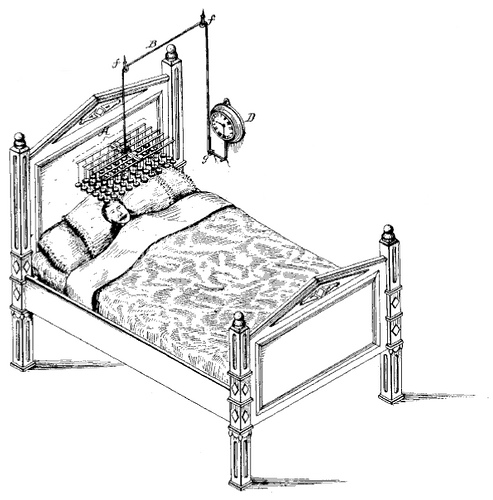
In his diary, Samuel Pepys tells of an odd feat performed by four little girls, who put “each one finger only to a boy that lay flat upon his back on the ground, as if he was dead: [at a signal] they did with their four fingers raise this boy as high as they could reach.” Pepys calls this “one of the strangest things I ever heard” but affirms that his friend Brisband witnessed it and saw the feat repeated on Sir G. Carteret’s cook, “who is very big.”
Strangely, I’ve found two other mentions of this. In Milledulcia (1857), his collection of selections from Notes and Queries, Robert Conger Pell notes that “a living man, lying on a bench, extended as a corpse, can be lifted with ease by the forefingers of two persons standing on each side, provided the lifters inhale at the moment the effort is being made.” “The inhalation of the lifters the moment the effort is made is doubtless essential.”
And in his Letters on Natural Magic (1883), David Brewster tells of an experiment in which “a heavy man is raised with the greatest facility, when he is lifted up the instant that his own lungs and those of the persons who raise him are inflated with air”:
The heaviest person in the party lies down upon two chairs, his legs being supported by the one and his back by the other. Four persons, one at each leg, and one at each shoulder, then try to raise him, and they find his dead weight to be very great, from the difficulty they experience in supporting him. When he is replaced in the chair, each of the four persons takes hold of the body as before, and the person to be lifted gives two signals by clapping his hands. At the first signal he himself and the four lifters begin to draw a long and full breath, and when the inhalation is completed, or the lungs filled, the second signal is given, for raising the person from the chair. To his own surprise and that of his bearers, he rises with the greatest facility, as if he were no heavier than a feather.
“As you have repeatedly seen this experiment, and have performed the part both of the load and of the bearer, you can testify how remarkable the effects appear to all parties, and how complete is the conviction, either that the load has been lightened, or the bearer strengthened by the prescribed process.”
I haven’t tried this myself, and for all I know it’s a joke or a stunt, but the accounts of Pepys and Brewster appear earnest and independent, and it seems unlikely that young girls could (or would) master a sophisticated illusion. I offer it here for whatever it’s worth.




